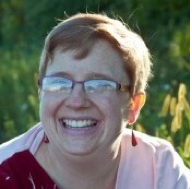Chaos can be our leverage to insight, our awakening to what is really going on.
Last week, I was almost hit by a car.
A woman pulled up to the busy street my street intersects, aiming to turn right on red. I noticed she wasn’t noticing me. I am a driver, too; sometimes, and as much as I try to pay attention, I don’t always.
I began to cross, my hand out to hit her car—this is my default defensive gesture from years of living on my feet and bike in a city—and sure enough, she advanced and my hand hit her hood, enough to snap her to attention so she hit her brakes and saw me. Her chin dropped open, a hugely apologetic expression on her face. A big adrenaline rush for both of us.
At that moment, I felt her genuine hubris, her sincere recognition of her mistake. I decided not to scream at her, though I really wanted to.
I was seething: seething fear, resentment and most of all, righteous indignation.
How dare she.
Why don’t drivers pay more attention?
I chewed on these juicy, thick thoughts the entire six lanes of street I crossed, and then, at the other side, safely out of car range, I sighed and let it drop. Somehow, my mind, my body had had enough.
It’s done. I didn’t get hit, I didn’t die. That’s a miracle.
This little shocking moment turned me around: from the poison of spite to a sliver of insight.
If you have read my other writings here on ele, you know I am not an affirmationist or a positivist. I do believe in the power of gratitude, but even more, I believe in the power of acknowledging privilege and reality. In that moment, I felt my privileged view of reality rear its head. The insight was my indignation:
I should not have to worry about this.
I often say to my writing students: let’s just assume this is going to be difficult—really, really hard—so when it gets hard, we don’t feel miffed or slighted or even that surprised. And when it goes well, we are pleased. This keeps us from asking the often-paralyzing perpetual question why, so that we can either change the situation or, if we can’t change it—which is true of most situations—we accept it and better direct our energy elsewhere.
Many years ago, I had the strange and powerful circumstance of spending a few hours with a woman working for a nonprofit that tracked ambulance and police response times for the city of San Francisco. I was utterly naive, one of my first extended stays in a big urban area, and when she asked me where I thought all the ambulances and hospitals were in the city, I had no idea there’d be a difference based on both race and class. But there is. Environmental pollution, sound pollution, lack of resources and access to safety: all of these safety issues and chaotic circumstances are affected by privilege.
While it is true that lots of people are not protected from high levels of unsafety, we are all subject to chaos.
The Universe—in whatever form of ruling or order it has—does not care about your wealth or poverty. Unlike the law, judicial system or your prejudicial neighbors, chaos is more like that driver who almost hit me. It was an unbiased moment of potential catastrophe.
After all, Pema Chodron’s book title is not “If Things Fall Apart,” it’s “When Things Fall Apart.”
Privilege blinds people to this chaos, giving a false sense of protection. Privilege also, admittedly, provides just enough actual benefit—accessible and responsive ambulances, for instance—to lull its participants into a sense of normalcy.
But death awaits us all. Ultimately, so far, no privilege changes that. Far-smaller accidents and tragedies than death occur constantly, across the board, no matter who you are. Maybe your death will come years, even decades, later if you have access to better medical resources and financial backing.
Each time things go wrong, especially if you are in a position of privilege, it might just be the best thing to do is to stop and carefully acknowledge how many other circumstances didn’t happen to you today: not being able to buy food, living in a dangerous neighborhood, being attacked because of your race(s) or gender(s), not having a home at all, not having a job.
***
A passage from The Shambhala Principle, where Sakyong Mipham Rinpoche discusses the famous quote from his father, Chogyam Trungpa Rinpoche, “Chaos should be regarded as extremely good news”:
I believe that the pain and confusion of the world is now so vivid and unavoidable that we have no choice but to acknowledge it. Perhaps this means that when we are finally fed up with torturing ourselves, others, and the planet, out of our exhaustion will arise a gap in which we come to our senses and collectively rediscover a more natural state. Only by staring directly at the confusion— examining it and absorbing its reality — will our species discover a way forward.
If, instead of being so afraid of all chaos, we can acknowledge unpreventable chaos, then it can leverage us back into reality from our cocoon-like dream world. We can more readily be present for when it strikes—and it will strike—and also fight against the preventable chaos that stands in the way of so many people living better lives.
Like enlightened society on Facebook.
Ed: Sara Crolick








Read 3 comments and reply